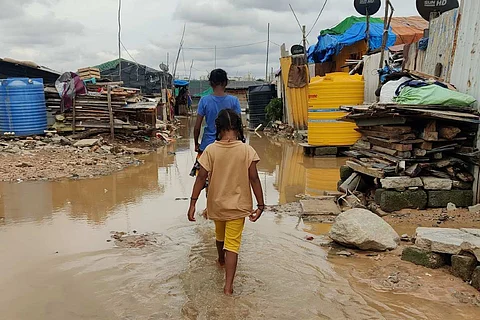

Indushree, a Class 6 student residing in Bengaluru’s Munnekolala, is scared to go back to school. The heavy rains that battered the city over the past few days had wreaked havoc in their slum settlement area, and all her school supplies were lost in the subsequent floods. “The school said they will not give us more books, so I'm afraid that we will be punished if we don't buy new books,” she tells TNM.
Munnekolala, located near Bengaluru’s Whitefield, is home to over 500 families, most of whom are daily-wage labourers ranging from pourakarmikas and autorickshaw drivers to construction and domestic workers. The families live in makeshift houses, and the area was among the worst affected by the heavy rain that inundated many parts of the city on the night of Monday, September 5. While the water has begun to recede in Munnekolala, the inundation threw their lives completely out of gear. The water had risen up to four feet from the ground level, while the heavy rain and flood disintegrated their makeshift homes, leaving furniture, clothes and plastic items floating hither and thither.
The Karnataka government has provided temporary shelters to the families in the form of tarpaulin sheet-tents on a higher plane of land, where the families have stored essential items like cooking vessels that were not washed away in the flood. When TNM visited Munnekolala, we found many of the residents scouring their flooded homes for money, mobile phones, clothes and other important belongings.
There are about 50 children living in the area, most of whom study in the nearby government primary school. In light of the water mayhem, the school has asked them to stay at home until next week. But like Indushree, many are scared to go back now, as the flood waters have submerged all their school supplies. “When the water receded a little bit, we went to find our belongings in our flooded house. But it is all lost now. It is impossible to find anything from under the dirty water,” says the 11-year-old.
Santosh, who studies in Class 3, says he is clueless about what to wear once school starts again, as their uniforms were also lost in the floods along with their books. “I asked my teacher if they would give us extra uniforms because mine got lost in the flood. They said that all their uniform materials are over, so they wouldn't be able to give us new ones. We have to wear our own clothes and go to school, but my clothes are also in my home, which is submerged now,” he says.
With little support from the government or the school, the children are forced to rely on their parents’ meagre earnings to tide them through this unprecedented situation. Santosh’s friend Shekhar, who is in Class 2 and wants to be an engineer when he grows up, says, “My parents tried to find my books in the flood, but they were all completely damaged. They don't have money to buy new books, but they said they will try.”
“We work so hard to send our kids to school. We don't earn much. Our living conditions are pathetic, but we want our children to have a better future than us — a future in which they wouldn't face the kind of problems we are currently facing,” laments Indushree’s mother, Gangamma. Besides, the school has now shifted to online classes for the safety of the students, she adds. “But only my husband has a phone. How will my children study when he is away for work? We haven’t even got electricity here for a week,” she says. Most of the children in the settlement camp do not have access to smartphones or even the internet for online classes. Instead, they now spend their time helping their parents clean up, or playing in the large puddles of dirty water.
Gangamma is scared that her children won't be able to continue their education. “Most of the children here usually drop out. I don't want my kids to go through the same. We came here to get work, so that we can settle down. But we don't even have a home now, and all our belongings are gone. This is always the fate of people like us,” she tells TNM.
Due to the waterlogging, residents’ access to essential commodities like drinking water was also cut off. As part of the relief efforts, the state government has provided a few cans of drinking water. However, these cans are being sold at a price of Rs 15 each, and most residents are therefore opting to store the rainwater in large drums, using this worm-infested water for drinking, washing and bathing.
Meanwhile, several student organisations have condemned the state government for not providing additional books, uniforms and other materials to students who were affected by the rains. Unions affiliated with the All India Central Council of Trade Unions (AICCTU) have also filed several complaints with the Bruhat Bengaluru Mahanagara Palike (BBMP) and state government authorities, seeking to ensure temporary shelter arrangements, provision of free ration, bedsheets and clothing among other facilities to those affected. The unions have also sought from the government compensation for the losses sustained by the people due to submergence of their household items, two-wheelers, ration, utensils, clothes, etc.